Ascvd risk assessment calculator
Elaining ASCVD Risk Scores for Primary Prevention Communicate that patients risk is likely higher than what is estimated by the risk calculator because of the presence of risk enhancing factors such as family history rheumatoid arthritis metabolic syndrome. ACCAHA Cardiovascular Risk Calculator.

Estimating Your Risk Of Heart Attack And Stroke There S An App For That The Skeptical Cardiologist
RaceEthnicity Choose One.

. They each include general questions about your health and possible risk factors for heart disease. In individuals aged 20 to 59 years of age a lifetime risk assessment is mentioned by guidelines with a low strength of evidence. AHA recommend that a risk calculator be used to determine your 10-year risk of CVD if you are age 40 to 75 and do not have heart disease.
Calculate your 10-year risk of heart disease or stroke using the ASCVD algorithm published in 2013 ACCAHA Guideline on the Assessment of Cardiovascular Risk. The risk is categorized as follows. In individuals aged 20 to 59 years of age a lifetime risk assessment is mentioned by guidelines with a low strength of evidence.
The most common heart disease risk assessments are known as. Risk Assessment Working Group - Assessing Cardiovascular Risk. One in two for men and one in three for women.
10-year risk for ASCVD is categorized as. Patients with primary LDL-C levels of 190 mg per dL or greater. In 5 quick minutes youll learn your risk for things like heart attacks and stroke and then well get you on the path to a stronger healthier you.
Low-risk. For more information about the inputs and calculations used in this app see Terms and Concepts in the Resources tab below. For some of the sex-age groups in Framingham the numbers of events are quite small.
The new app also has an updated design consistent with ACCs. ASCVD stands for atherosclerotic cardiovascular disease. Not needed in secondary prevention LDL-C 190 mgdL.
Use ASCVD risk estimator plus. In lower risk primary prevention adults 40-75 years with LDL-C 70 mgdL18 mmolL. This lifetime estimation was based on a paper published in 2006 that was developed by assigning a patient.
A cardiac risk calculator cardiovascular risk assessment evaluates your unique information to gauge your future risk of heart disease. This lifetime estimation was based on a paper published in 2006 that was developed by assigning a patient. Chair Voting David C.
Updated systematic reviews addressing discrimination calibration reclassification cost and safety issues in the context of the newer ASCVD risk assessment model proposed in the present document are neededCIMT was associated with CHD but the document provides little evidence for reclassification discrimination calibration and cost. A person can then use this information for guidance on. The Framingham risk score estimates the risk of developing CHD within a 10-year time period.
The ASCVD Risk Assessment Calculator gives both the 10-year and lifetime risk of developing atherosclerotic heart disease which includes heart attack and stroke. Assign to statin treatment group. Low-risk.
Wake Forest University School of Medicine. Central Time on the deadline date. The ASCVD Risk Calculator assesses heart disease risk.
Low-risk. Proposals must be received no later than 3 pm. Less than 5 low risk 5 to less than 75 borderline risk 75 to less than 20 intermediate risk Greater than or equal to 20 high risk.
This calculator helps health care providers to estimate 10-year risk for atherosclerotic cardiovascular disease ASCVD defined as coronary death or nonfatal myocardial infarction or fatal or nonfatal stroke based on the Pooled Cohort Equations. AHEAD Research Inc AHEAD provides a web application risk assessment tool. Age Gendersex Raceethnicity eg South Asian ancestry is high-risk Family history of CAD 55 y in a male or.
When to perform ASCVD risk assessment. Lifetime Risk Calculator only provides lifetime risk estimates for individuals 20 to 59 years of age. The commonly recognized risk factors for CAD are shown below.
Estimate 10-year risk for atherosclerotic cardiovascular disease. The calculator measures and analyzes cardiovascular health to predict the risk of developing atherosclerotic cardiovascular disease ASCVD. Early submission is encouraged.
10-year risk for ASCVD is categorized as. All proposals must be submitted electronically via ProposalCentralThe system will open eight. Goff Jr MD PhD.
This calculator assumes that you have not had a prior heart attack or stroke. If you have generally it is recommended that you discuss with your doctor about starting aspirin and a statin. Patients with diabetes mellitus 40 to 75 years of age with LDL-C levels of 70.
Age 45-85 years Years. 10-year risk for ASCVD is categorized as. For patients ASCVD risk assessment using a risk calculator can help guide the care of the patient.
Congratulations for taking some time to protect your health. Coronary Artery Calcification Agatston 4. ASCVD Traditional Risk Markers Cardiovascular Disease Risk.
Study Quality Assessment Tools. For more information about the inputs and calculations used in this app see Terms and Concepts in the Resources tab below. Calculates ASCVD risk for heart disease and stroke using the 2013 ACCAHA guidelines.
Systematic Evidence Review from the Risk Assessment Work Group. The CV Risk Calculator and other offerings are collectively called. Nearly all cases of coronary heart disease are caused by atherosclerosis.
1 A long-term risk assessment may be more accurate in younger individuals free from ASCVD eg 20 to 59 years old. The name ASCVD Risk Estimator Plus represents that the updated app is a combination of the original ASCVD Risk Estimator functionality plus the 2016 Million Hearts Longitudinal ASCVD Risk Assessment Tool published in 2016 and additional up-to-date guideline recommendations. People with 2 of the risk factors are at high risk of developing CAD.
For more information about the inputs and calculations used in this app see Terms and Concepts in the Resources tab below. Patients with any form of clinical ASCVD. This risk score may not adequately reflect the long-term or lifetime CHD risk of young adults which is.
Lifestyle therapies heart-healthy diet and regular exercise. However the validated risk calculators do not provide risk estimates for patients under 40 years of age so the risk can be roughly estimated only by entering a. You and your healthcare provider can use this information to take steps to reduce your risk.
MESA 10-Year CHD Risk with Coronary Artery Calcification Back to CAC Tools 1. There are different types of heart disease risk assessment. Before beginning an application review the eligibility and requirements that apply to all AHA research awards at AHA Application Information page.
Also incorporates JNC-8 blood pressure guidelines and USPSTF aspirin prescribing guidelines. 1 A long-term risk assessment may be more accurate in younger individuals free from ASCVD eg 20 to 59 years old. A cardiac risk assessment is a group of tests and health factors used to determine the chance of having a heart attack or stroke.
2

Ascvd Risk Estimator Plus This Online Tool Is Simple To Use And Download Scientific Diagram
Ascvd Risk Calculator
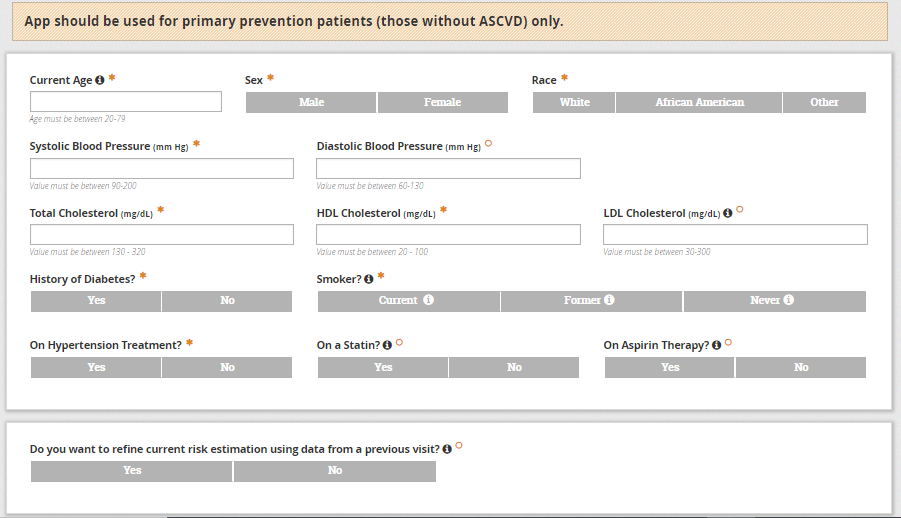
A Link To And Resources From The Ascvd Risk Estimator Plus Tom Wade Md
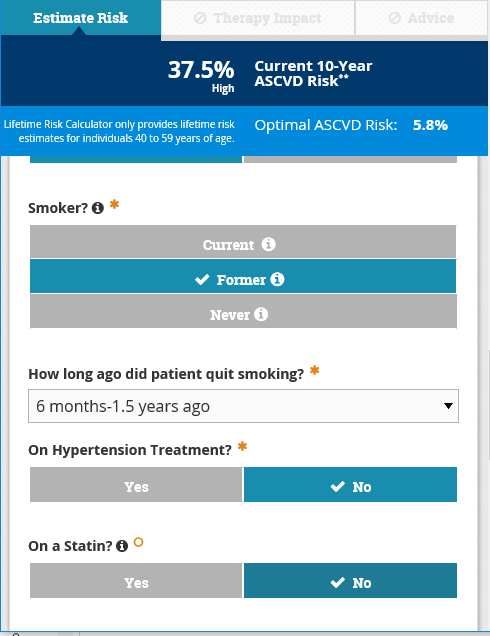
Ascvd Risk Estimator Plus American College Of Cardiology
Ascvd Risk Estimator

Ascvd Risk Estimator

Cardiovascular Risk Estimation By The Ascvd Risk Estimator Application In A University Hospital International Journal Of Cardiovascular Sciences
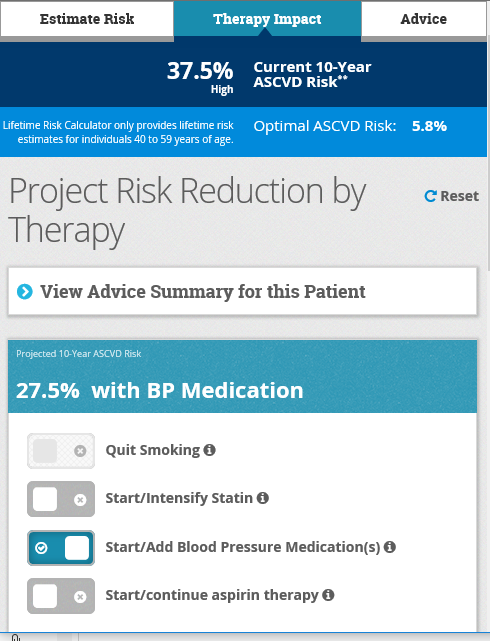
Ascvd Risk Estimator Plus American College Of Cardiology
App Review Acc S Ascvd Risk Estimator Plus App American College Of Cardiology

Ascvd Risk Estimator
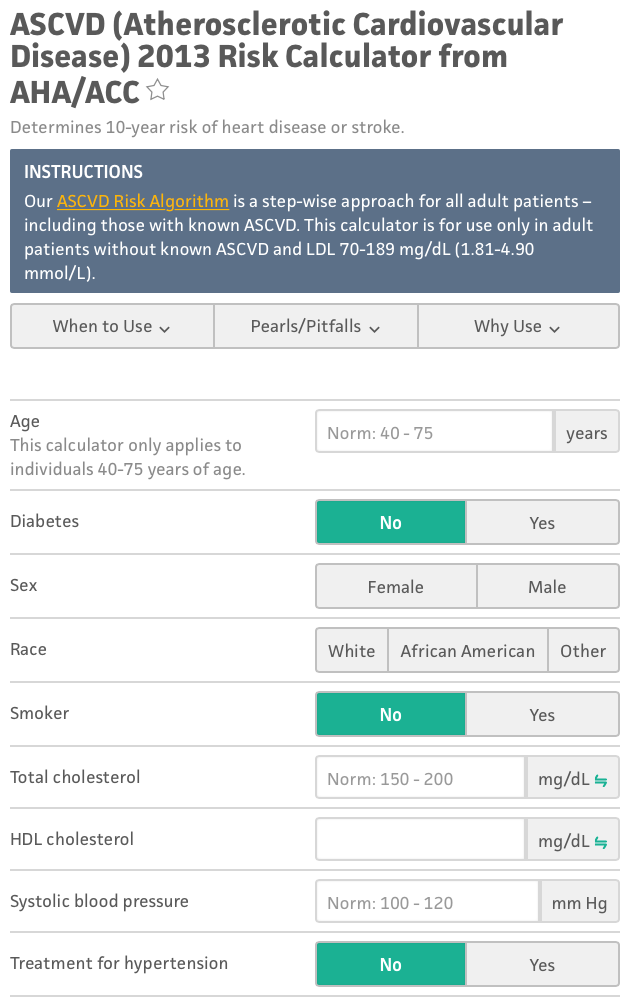
Implementation Of Cardiovascular Screening In Hispanic Patient Population With Ra Sle And Psa Acr Meeting Abstracts
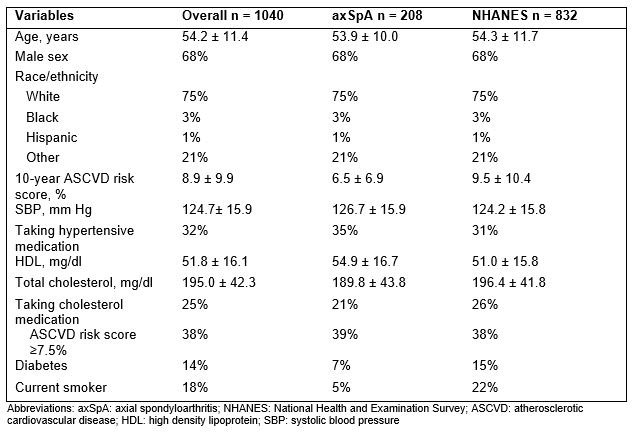
Ten Year Atherosclerotic Cardiovascular Disease Risk Scores In Axial Spondyloarthritis Versus The General Population A Cross Sectional Study Acr Meeting Abstracts

Criteria For Ascvd Risk Assessment Treatment Goals And Levels At Download Table
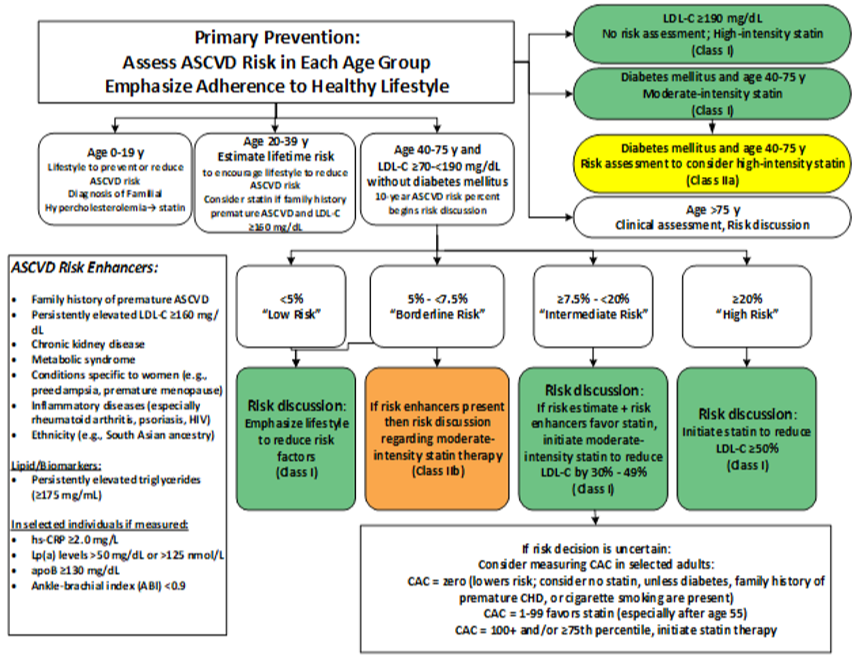
Ascvd Risk Estimator

2019 Acc Aha Guideline On The Primary Prevention Of Cardiovascular Disease A Report Of The American College Of Cardiology American Heart Association Task Force On Clinical Practice Guidelines Circulation

10 Year Ascvd Risk Score Stratification At Baseline Download Scientific Diagram